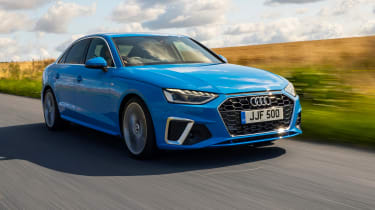If you’ve ever looked at car leasing deals, you may have been tempted to flick the virtual switch to see the difference in cost between personal and business lease cars. Business car leases are usually quite a bit cheaper per month and overall. So how does business car leasing work, who is business leasing suitable for, and can you get a company car on a business lease to save money? Read on to find out.
What is business car leasing?
A business leasing deal is similar to a private lease, but it’s available for sole traders, limited businesses, limited partnerships and Limited Liability Partnerships (LLPs), along with charities. A business must be trading, demonstrate a suitable profit level and provide a credit check to be able to lease a car. This type of deal allows the company to lease a car with fixed monthly payments, and the vehicle can usually be used for both business and personal use. It can be a good way to ensure employees are driving new cars, which bolster the firm’s image and provide the latest safety, technology and fuel-efficiency.
An initial payment is required at the start of the lease contract, which is usually expressed as a multiple of the monthly payment, and tends to be three, six or nine times the amount of the regular payment. For example, if the agreed contract were described as ‘6+35’, the deal would require an initial payment of six months upfront, followed by 35 instalments of the monthly fixed payment amount.
These deals are sometimes also referred to as Business Contract Hire (BCH) and the business or business owner never owns the car, they are essentially hiring it on a long-term basis. At the end of the deal, the car is simply handed back and, so long as it’s in good condition, that’s it. However, it’s important to note that if the car is damaged or has been improperly maintained, this could result in additional charges, depending on the contract’s small print.
At the start of a business leasing deal contract, the maximum vehicle mileage is also specified, along with the charges the keeper is liable to have to stump up if the mileage cap is exceeded. These charges can even be passed on to an employee if they’re deemed responsible for the extra miles.
The mileage cap for business lease cars is typically much higher than for personal lease vehicles, taking into account the typical usage profile of a company car, which is more likely to rack up lots of motorway miles.
Can you save money on business car leasing?
If a business leased car is used solely for business purposes, up to 100 per cent of the VAT can be recovered. If the car is used for mixed business and personal trips, up to 50 per cent can be claimed. The same ratios also apply to servicing costs, fuel and mileage. This can result in significant savings of up to 20 per cent for an equivalent privately leased car.
What is a business lease purchase?
If you would prefer for your business to pay towards the value of owning one or more vehicles, instead of essentially hiring them, business lease purchase is another option. This works in a very similar way to Personal Contract Purchase (PCP), which is currently the most popular method of buying a car in the UK for private buyers.
A deposit is required, followed by a fixed number of monthly payments, typically over 24, 36 or even 48 months. At the end of this period, the business can either pay a balloon payment to buy the car outright or choose to switch into a new vehicle, using the equity as a deposit.
The balloon payment is calculated based on the car’s value at the end of the lease, and just like business leasing, there can be additional costs if the vehicle is damaged or covers more miles than agreed before it’s handed back.

